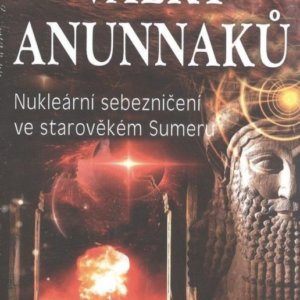 4
4

Examining the pyramid with the mions
 19. 04. 2024
19. 04. 2024



 4
4

 19. 04. 2024
19. 04. 2024

 1
1

 17. 04. 2024
17. 04. 2024
 6
6

 16. 04. 2024
16. 04. 2024
 1
1
 29. 03. 2020
29. 03. 2020

Anu was one of the oldest gods of the Sumerian pantheon and was considered the father and the first king of the gods. It is referred to as the precursor of ancient Anunnaks.
In Sumerian mythology, An (Sumerian An = "heaven") or Anu (in Akkad) was the god of heaven, the constellation master, the king of the gods who lived with his wife, the goddess Ki (in Sumerian, "Earth" or Antu in Akkadian) the highest areas of heaven. He was believed to have the power to judge those who committed crimes and to create stars as soldiers to destroy the wicked. His attribute was a royal tiara. His servant and minister was the god Ilabrat. More importantly, he was the father of Enllil, the ancient Mesopotamian god of wind, air, earth and storms, and the forerunner of the Anunnakes, the supreme source of all authority.
Anunnaki were considered to be heavenly beings who came to Earth thousands of years ago.
An Anunnak's predecessor - those who descended from heaven. So who were the ancient Anunnaki??
The term ANUNNAKI, if subdivided, is translated; ANU: "Heaven" -NNA: "Descend" - KI: "Earth": "Those who descended from heaven to earth…"
Many authors today are convinced that they are neither gods nor angels, but beings from another planetthat came to Earth as technologically advanced and knowledgeable in advanced physics, capable of manipulating the ideas of the "lower" race and turning them into a slave species.
In front of a technological civilization like Anunnaki, one fell on his kneesconsidering them heavenly gods with the ability to control heaven and earth. In other words, these "gods" were misinterpreted as the supreme deities because they possessed technology that the primitive man did not understand.
An was one of the most powerful and most important deities in the Sumerian pantheon, and it was believed that the Anunni gods were the offspring of Anu and his wife Ki. According to Jeremy Black and Anthony Green in their books "Gods, Demons, and Symbols of Ancient Mesopotamia: An Illustrated Dictionary", The ancient Anunnaki were the" descendants of Anu. "
"The Seven Gods who Decree (Destiny) ”can be assigned to the Anunnak Group: An, Enlil, Enki, Ninhursag, Nanna, Utu, and Inanna. When we mention Anunnaki, the ancient Sumerian tables do not refer to these gods as mere etheric creatures but describe them as biological beings of flesh and blood as humans. When we talk about the Gods, we picture the images of misty heavenly spirits emerging from the boundaries of an indeterminate plane of reality. However, this is not the description the Sumerians gave to the Anunnaks.
These gods were real in every direction with the old Sumerians. The gods coexisted with man, these heavenly beings shared their lives and coexisted with man in ancient cities on Earth. They were the physical and tangible beings they ate, they slept, they faded. These gods were visible to anyone's eyes; they are described as they travel to the heavens in mighty airships that emit noise, sounding like thunder, when the mountains trembled as they exhaled fire.
Anu was considered one of the oldest gods of the Sumerian pantheon and was part of the trio the great gods together with Enil, god of air and atmosphere, and Enkim (also known as Ea in Akkad), the god of the earth or foundation. He was considered the father and the first king of the gods. Anu is connected to the E-anna temple of the city of Uruk (biblical Erech) in the south of Babylon, and there is good reason to believe that this place is the original worship site of Anu. The temple of Anu in Uruk was called E-an-na (the "house of heaven"). “In heaven, Anu is clothed on his throne with all the attributes of sovereignty: scepter, tiara, headband, staff…
His army consisted of stars. The king symbolically received his power directly from Anu. Therefore, they invoked only the rulers and not other mortals. Anu was: "Father of the gods" (abu ilâni), "Father of heaven" (ab shame), "King of heaven" (il shame). The Western Semitic equivalent of Anua used to be God Ël. And it seems to be equivalent to Dagon's God of the Philistines and Phoenicians. Astronomically, Anu was associated with the Path of An (or Path of Anu), the area of the sky coinciding with the equator. Later this area will be defined as the space between two tropics (Tropic of Cancer on the North and Obratník Kohozora in the Southern Hemisphere, among which may be the Sun in Zenith - transl.). It was linked to the 60 number, a sacred number for Summers.
Chris H. Hardy: The War of the Anunnakes
Sumerian Empire was destroyed because of wars between people and gods who did not hesitate to use in their struggles nuclear weapons. One piece of evidence is to be found radioactive skeleton or content of Sumerian clay tables. Tuesday offers readers a look at the relationships between the gods of the Anunnakes and humanity and how their development has taken place. Based on this knowledge, he examines the power struggles that broke out between them. You probably had the first one nuclear war on our planet.

Chris H. Hardy: The War of the Anunnakes